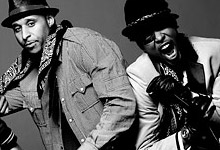
Features | Concerts
Game Rebellion / Ninjasonik / Navegante
By Chris Molnar | 26 June 2011
Spread across two stages in the basement of the East Village’s predictably insane Lit Lounge, there was the feeling amongst the crowd that something rare, something nascent was emerging. What it was not: the corporate posturing of Odd Future; the indie rock joshing of Das Racist; the outre head-rap of Shabazz Palaces; trendy; nostalgic. What it was: packed; free; unadvertised; flawed; intensely local; more unexpectedly incendiary than any concert I’ve ever seen.
Essential to the success of the show was Navegante, a trio whose earnest electro-pop recordings bear little relation to the immense funk they bring as a live band. At Lit, Jean Shepherd’s often overpowering vocals were completely vocodor’d, his up-with-people lyrics replaced by a focus on the bass and drums and verse after verse from the assembled rappers. By themselves, Game Rebellion’s Bad Brains pretensions tend more towards Rage Against the Machine, and Ninjasonik’s lack of live accompaniment shed too much focus on their simple catchphrases. But Navegante, who played in between each act on their own stage, brought a practiced concentration to the dancefloor, no doubt due in part to their residency at Camaradas in East Harlem.
It’s not too radical of an idea: amorphous grooves, freestyles, all in service of moving the audience. It just takes an unbelievable group of musicians and rappers to not hinder the show’s impeccable flow, which, as the inanity of singles like Ninjasonik’s “Tight Pants” or Navegante’s “All In Ur Head” prove, isn’t an idea that often makes it intact to the recording studio. But when the drums hit over the “All In Ur Head” sample and Shepherd played its distorted groove on the cuatro (a Puerto Rican guitar), the elements that make them one of the best instrumental rap groups around—even if they avoid the genre on record—were totally unobstructed. Telli Gramz and Reverend McFly of Ninjasonik weren’t necessarily rapping about much of anything, but as hypemen for the band they were perfect, ramping up the energy without being much more than capable and neutral cogs in the process’s greater whole.
The humble spirit with which Navegante ruthlessly minimize their own songs—bowing vocals out in favor of more party-friendly rappers, building their stuttering, drum-heavy groove with the utmost patience—is one which can only be learned with the help of a dedicated, localized audience. It’s a sentiment and excitement they wield that hasn’t translated onto record yet, but which has wide-ranging possibilities—possibilities which could transcend merely having a “sound.” That they can take their humble, out-of-time peers and unite them, essentially, acting like live-action mixtape producers, is the sort of feat which deserves a wider audience. Not that Navegante is at all interested in one. Which is probably another reason why what they do works so well.





